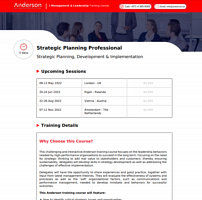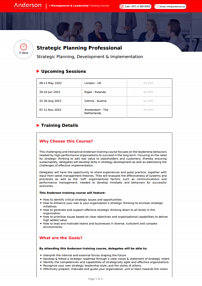- Course Finder
- Formats
- Training Topics
- Business Strategy
- Management & Leadership
- Personal Development Skills
- Innovation & Creativity
- Emotional Intelligence
- Governance and Compliance
- Business & Life Synergy
- Business Agility
- Business Sustainability
- Digital Transformation & Savviness
- Executive & Administrative Support
- Customer Service
- Sales & Marketing
- Human Resource HR Management
- Finance & Budgeting
- Data Science and Protection
- Project Management
- CertNexus
- Special Courses
- 10 Day Seminars
- The Essential Skills
- The Advanced Skills
- The Mini MBA Series
- Bootcamps
- Training Venues
-
- Certificates
- Calendars
- About us
- الدورات العربية
Upcoming Sessions
| 12-16 Aug 2024 | London - UK | $5,950 |
| 11-15 Nov 2024 | Dubai - UAE | $5,950 |
| 10-14 Feb 2025 | Dubai - UAE | $5,950 |
The training course is also available in Online format. Discover the dates
View Online formatTraining Course Overview
Why should an organisation pay attention to developing good Labour/ Employee Relations? Events in the most well-run of organisations can leave employees experiencing feelings of unfairness, alienation, demotivation and frustration. However, with positive employee relations, an organisation can ensure that by addressing the employee’s or group’s complaint quickly and fairly and at the lowest level possible within the organisation, a positive outcome is assured and issues are not escalated.
This Anderson training course looks at the role of managers and employee representatives, and how they can nurture trust-based relationships within the organisation and generate a positive work culture which improves the overall productivity and output of a business, as well as benefiting the employee’s personal well-being even when conflict arises.
Training Course Objectives
By attending this Anderson training course, delegates will be able to:
- Understand the Strategic Nature of Employee Relations
- The Role of Unions and other Employee Representatives
- Recognise the importance of Employee Engagement
- Develop Performance Management that works
- Understand mediation, bargaining and collective agreements
- How to investigate and handle grievances, settlements, and arbitration
Designed for
This Anderson training course is suitable to a wide range of professionals but will greatly benefit:
- Managers new to a unionised work environment
- Front-line supervisors and team leaders responsible for creating positive working relationships with unionised workers
- HR supervisors and labour relations leaders overseeing skilled trades professionals
- HR specialists responsible for Employee Relations, Negotiating and Mediating
Day One: The Importance of Effective Employee Relations
- Why Workplace Relations Matter
- Industrial and Employee Relations – Differences and Similarities
- Features of the Unionised Workplace – What Role Do Unions Play?
- Building Culture in a Unionised Environment
- Defining Acceptable Norms and Mores
- Collective Agreements and Terminology
Day Two: Interests, Rights and Power
- Interests – Motivation, Engagement, Trust
- Rights – Establishing Boundaries, Rights and Obligations
- Power – Discipline, Accountability and Boundary Enforcement
- Bargained Rights vs. Residual Rights
- Making and Enforcing Rules
- Organisational Policies and Procedures
Day Three: Performance Management
- Creating a Performance Based Culture
- Setting Expectations and Performance Standards
- Responsibilities of the Union and Management
- Discipline, Grievances and Investigations
- Coaching and Assistance to Improve Performance
- Managing Absenteeism
Day Four: Dispute Resolution - Handling Industrial Action
- Nature of Conflict
- Types of Industrial Action
- Mediation and Conciliation
- Negotiating
- Management Responses
- Rights to Dismiss and Discipline
Day Five: Alternatives to Unions
- Importance of the Employee Voice
- Joint Consultative Committees
- Employee Representatives
- Forums and Quality Circles
- Partnerships
- Role of Legislation

- Anderson Certificate of Completion will be provided to delegates who attend and complete the course
- The HRCI Approved Provider Seal and the corresponding Recertification Credit Hours Awarded will be reflected on the Certificate of Completion
Training Course Overview
Why should an organisation pay attention to developing good Labour/ Employee Relations? Events in the most well-run of organisations can leave employees experiencing feelings of unfairness, alienation, demotivation and frustration. However, with positive employee relations, an organisation can ensure that by addressing the employee’s or group’s complaint quickly and fairly and at the lowest level possible within the organisation, a positive outcome is assured and issues are not escalated.
This Anderson training course looks at the role of managers and employee representatives, and how they can nurture trust-based relationships within the organisation and generate a positive work culture which improves the overall productivity and output of a business, as well as benefiting the employee’s personal well-being even when conflict arises.
Training Course Objectives
By attending this Anderson training course, delegates will be able to:
- Understand the Strategic Nature of Employee Relations
- The Role of Unions and other Employee Representatives
- Recognise the importance of Employee Engagement
- Develop Performance Management that works
- Understand mediation, bargaining and collective agreements
- How to investigate and handle grievances, settlements, and arbitration
Designed for
This Anderson training course is suitable to a wide range of professionals but will greatly benefit:
- Managers new to a unionised work environment
- Front-line supervisors and team leaders responsible for creating positive working relationships with unionised workers
- HR supervisors and labour relations leaders overseeing skilled trades professionals
- HR specialists responsible for Employee Relations, Negotiating and Mediating
Day One: The Importance of Effective Employee Relations
- Why Workplace Relations Matter
- Industrial and Employee Relations – Differences and Similarities
- Features of the Unionised Workplace – What Role Do Unions Play?
- Building Culture in a Unionised Environment
- Defining Acceptable Norms and Mores
- Collective Agreements and Terminology
Day Two: Interests, Rights and Power
- Interests – Motivation, Engagement, Trust
- Rights – Establishing Boundaries, Rights and Obligations
- Power – Discipline, Accountability and Boundary Enforcement
- Bargained Rights vs. Residual Rights
- Making and Enforcing Rules
- Organisational Policies and Procedures
Day Three: Performance Management
- Creating a Performance Based Culture
- Setting Expectations and Performance Standards
- Responsibilities of the Union and Management
- Discipline, Grievances and Investigations
- Coaching and Assistance to Improve Performance
- Managing Absenteeism
Day Four: Dispute Resolution - Handling Industrial Action
- Nature of Conflict
- Types of Industrial Action
- Mediation and Conciliation
- Negotiating
- Management Responses
- Rights to Dismiss and Discipline
Day Five: Alternatives to Unions
- Importance of the Employee Voice
- Joint Consultative Committees
- Employee Representatives
- Forums and Quality Circles
- Partnerships
- Role of Legislation
Accreditation

The Certificate
- Anderson Certificate of Completion will be provided to delegates who attend and complete the course
- The HRCI Approved Provider Seal and the corresponding Recertification Credit Hours Awarded will be reflected on the Certificate of Completion
Info & In-house Solution
For more information about this course, call or email us at:
Call us: +971 4 365 8363





